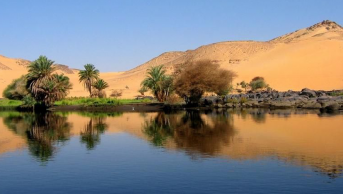On the Revitalization of the Memorandum of Understanding on Water Issues Between Iraq and Turkey: A Hopeful Prospect

Beside the re-handling of the Memorandum of Understanding on Water Issues Between Iraq and Turkey during his visit to Turkey last week, visionary remarks by Iraqi Water Resources Minister His Excellency Dr. Hassan Jenabi at the Embassy of Iraq signaleda new beginning in the long history of Turkish-Iraqi water dialogue.
The main axis of new era will certainly be the revitalization of a Memorandum, namely ‘’Memorandum of Understanding in the Field of Water between the Ministry of Forestry and Water Affairs of the Republic of Turkey and the Ministry of Water Resources of the Republic of Iraq’’. It has been nearly a decade since the MoU was first signed.
Nevertheless, since then, there was no chance to implement this legislation due to cooling of relations between two countries. Iraq did not even approve this Memorandum. Disagreement over legitimacy and practices of Maliki government in Iraq, and Ankara’s relations with the Kurdish regional administration in northern Iraq in particular were quite decisive in escalation of tensions between Baghdad and Ankara
The recitals of the MoU are also worth analyzing which concisely represent the spirit of the common understanding. The Parties express ‘’the desire to strengthen the friendly relations between Turkish and Iraqi people and to develop cooperation on water issues’’, recognize ‘’the importance of sustainable development approach in the protection, improvement and utilization of water resources for the health and welfare of current and future generations’’, keep in mind that ‘’natural resources and environment protection necessitate scientific, technical and technological close cooperation’’. So, in a nutshell, the MoU should be read in the light of three fundamental principles: good neighborliness, sustainable development, and science driven policy.
With the MoU on water, two sides had agreed to exchange hydrological and meteorological information. The MoU stipulates that a joint database shall be formed. According to MoU, Syrian data shall be included in this database (Article 2.f). Two countries also agreed to exchange expertise regarding these matters.
Turkey and Iraq stated the principle of efficient utilization and management of regional water resources. In line with this, two countries agreed that joint studies will be implemented on the modernization of current irrigation systems and the use of closed and pressurized systems in the irrigation networks that will be newly set up.Again, as related to water use efficiency, both Turkey and Iraq will conduct joint studies in order to prevent the loss of drinking water (in the water infrastructure).
One of the articles of the Memorandum was emphasizing the intention of two countries to conduct tripartite technical meetings (including Syria) with an aim of a basin-wide cooperation(Article 2.h). Other main topics for cooperation include flood management, calibration of existing and setting up of new hydrologic measurement stations, sedimentation related problems in Iraq, and dam management.
Article 3 of the Memorandum lists a number of concrete steps to be taken in order to enhance processes of cooperation discussed in Article 2: 1- joint technical/scientific research and programs, 2- development of cooperation projects, 3- activities of research and development; and exchange of scientific/technical information and documents, 4- exchange of water technologies, 5- exchange of officials, experts and researchers, 6- organization of educational programs, meetings, conferences and symposia, 7- and other cooperation methods that parties may see as appropriate. Furthermore, with the memorandum, both parties agreed to establish the post of a National Coordinator. Information regarding the National Coordinator will be exchanged between the parties. Each National Coordinator will draft an “Annual Work Plan” (Article 6). Therefore, the MoU intended to add an institutional dimension to transboundary water cooperation between Iraq and Turkey. In terms of the duration, two sides agreed that the MoU shall, initially, remain in force for a period of five years.
Transboundary water relations between modern Iraq and Turkey dates back to mid-1940s. Since then, two countries have come together dozens of times in order to discuss how they might give a boost their people’s wealth through optimum utilization of water resources that they share. It is unnecessary to discuss the significance of water resources for both countries: it is a vital input for sectors of energy, agriculture, manufacturing, tourism, so on, so forth. The question is how two countries realize- sooner the better- concrete results in a politically fragile and environmentally degrading geography (read ‘climate change impacts’). Nevertheless, there is hope.
Equipped with a holistic and rational view on the water issues in our broader region, Dr. Janabi represents a positive turn in transboundary water issues between two countries and even in wider neighborhood,whose term promises an opening of a window of opportunity where both Iraq and Turkey can benefit through realization of win-win scenarios including those on data exchanges, water efficiency projects, the fight with desertification and erosion, and much more.










